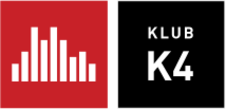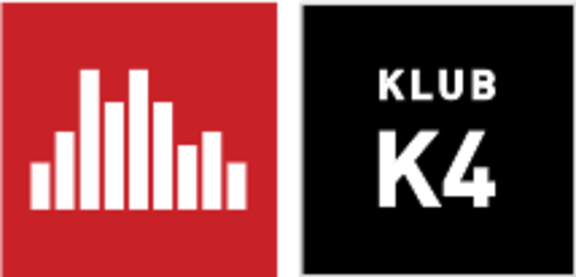Difference between revisions of "Klub K4"
| Line 23: | Line 23: | ||
{{Teaser| | {{Teaser| | ||
| − | Part of the [[K6/4 Institute]], [[Klub K4]] has been known for over a two decades as a focus for progressive music culture in Slovenia and an active generator of music trends. It hosts guest artists from abroad and also provides a platform for new, unconventional Slovene musical talents. K4's programme concept is focused on contemporary and avant-garde music trends and urban culture, | + | Part of the [[K6/4 Institute]], [[Klub K4]] has been known for over a two decades as a focus for progressive music culture in Slovenia and an active generator of music trends. It hosts guest artists from abroad and also provides a platform for new, unconventional Slovene musical talents. K4's programme concept is focused on contemporary and avant-garde music trends and urban culture, encompassing various genres, primarily electronic music, multimedia and hip hop by hosting various club events.}} |
== History == | == History == | ||
| − | K4 formally established in [[established::1989]], but was unofficially running since late 1980's under [[ŠKUC Association|ŠKUC]]. Always following alternative underground musical trends | + | K4 formally established in [[established::1989]], but was unofficially running since late 1980's under [[ŠKUC Association|ŠKUC]]. Always following alternative underground musical trends, club went through various programme exchanges, hosting punk, grunge and rock to hip-hop and nowadays more or less just electronic club events. K4 was the starting point for many Slovene musicians, DJs (Umek and Kanzyani), rappers (Ali-En, Klemen Klemen, N'Toko and Trkaj), and other cultural workers (Aldo Ivančič, Aida Kurtović, Jure Longyka) and was, in the late 90's, the the first club to introduce rave, techno and house music to Slovene public. |
| + | |||
| + | == Events == | ||
| + | Nowadays K4 is a nightclub | ||
| + | |||
| + | == Collaborations == | ||
| + | The club | ||
Revision as of 14:18, 8 August 2012
History
K4 formally established in 1989, but was unofficially running since late 1980's under ŠKUC. Always following alternative underground musical trends, club went through various programme exchanges, hosting punk, grunge and rock to hip-hop and nowadays more or less just electronic club events. K4 was the starting point for many Slovene musicians, DJs (Umek and Kanzyani), rappers (Ali-En, Klemen Klemen, N'Toko and Trkaj), and other cultural workers (Aldo Ivančič, Aida Kurtović, Jure Longyka) and was, in the late 90's, the the first club to introduce rave, techno and house music to Slovene public.
Events
Nowadays K4 is a nightclub
Collaborations
The club




